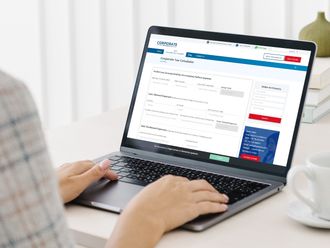
Dubai: Single individual owned-and-operated businesses – consultants, freelancers, independent property brokers – have another 12 months to go before they need to file for UAE corporate tax, but there are still a few details they need to work on well in advance.
Recently, the UAE Ministry of Finance clarified the deadlines for tax registrations for businesses, including those operated by ‘natural persons’. While traditional businesses must register based on the license date of their companies, natural persons have been given until March 31, 2025 to ensure they are full corporate tax compliant.
Now, single individual businesses come under corporate tax regimes if their annual turnover exceeds Dh1 million.
But the most important detail is that any such individual with a business must still sign up for corporate tax registrations. “If the individual has a ‘self-sourced income’, whether that’s Dh200,000 or Dh1 million, they are better off registering,” said a consultant. “Whether they file for corporate tax now or just before March 31, 2025 is entirely their choice.”
Self-employed property agents, consultants
Individuals based in the UAE who are currently employees but have their organization’s approval to take on freelance projects of their own too should prep for corporate tax registration. For instance, if the individual moonlights as a property or IT consultant and generates income based out of that, then this does come under the corporate tax framework.
“Licensed property agents who are not employed with any brokerage firm can take in income from a transaction,” said the consultant. “With commissions exceeding 5 per cent on a luxury home sale, the individual’s take-away from any deal initiated by him can be substantial.
“And coming under the ambit of corporate tax registrations.”
‘Clarity’ on income
Girish Chand is Senior Partner at Dubai-based MCA Management Consultants. He says these natural person operated businesses’ strategy on corporate tax registration is entirely dependent on ‘clarity’ of the income generated.
“In case of clear ‘business income’, they can go ahead and register at their convenience before year end,” said Chand. “The important element at this stage is to maintain segregation between what’s considered personal income - salary, investment income and real estate related income - and business related income.
“They need to track the business income and estimate whether it is likely to exceed Dh1 million for 2024. Also, proper accounting records need to be maintained which can facilitate their return filing.” (The requirements also hold true for non-resident natural persons generating income from any business activity they conduct in the UAE.)
It’s all in the turnover
Since the corporate tax mandate for ‘natural persons’ with a business is based on revenues, they cannot afford not to register. “Even individuals who have run up losses will have to register,” said Chand. “Also, they can carry forward the losses to be adjusted against future taxable profits (if that applies).”
Wait to register? Or do it at the earliest?
Since the Ministry of Finance clarified end March 2025 as the cutoff for individual operated businesses to register, their owners are in two minds – wait to see out this year and then file? Or get the process done and dusted with?
“The more disciplined ones are asking the questions now - and asking us to register,” said Nasheeda, founder of Nishe Accounting & Consulting. “Our advice would be to not delay registration if they are above the Dh1 million threshold, as registration then is not a choice.
“There are other concessions in the tax law such as small business relief, carry forward of tax losses, 0 per cent tax on profits below Dh375k etc. which they can take advantage of while computing their tax payable and filing returns. This way they can to minimize their tax liability provided they meet the underlying criteria.”
For UAE’s freelancers, independent tax consultants and real estate agents, it’s time to start on doing the sums. And decide when they should register for corporate tax…












